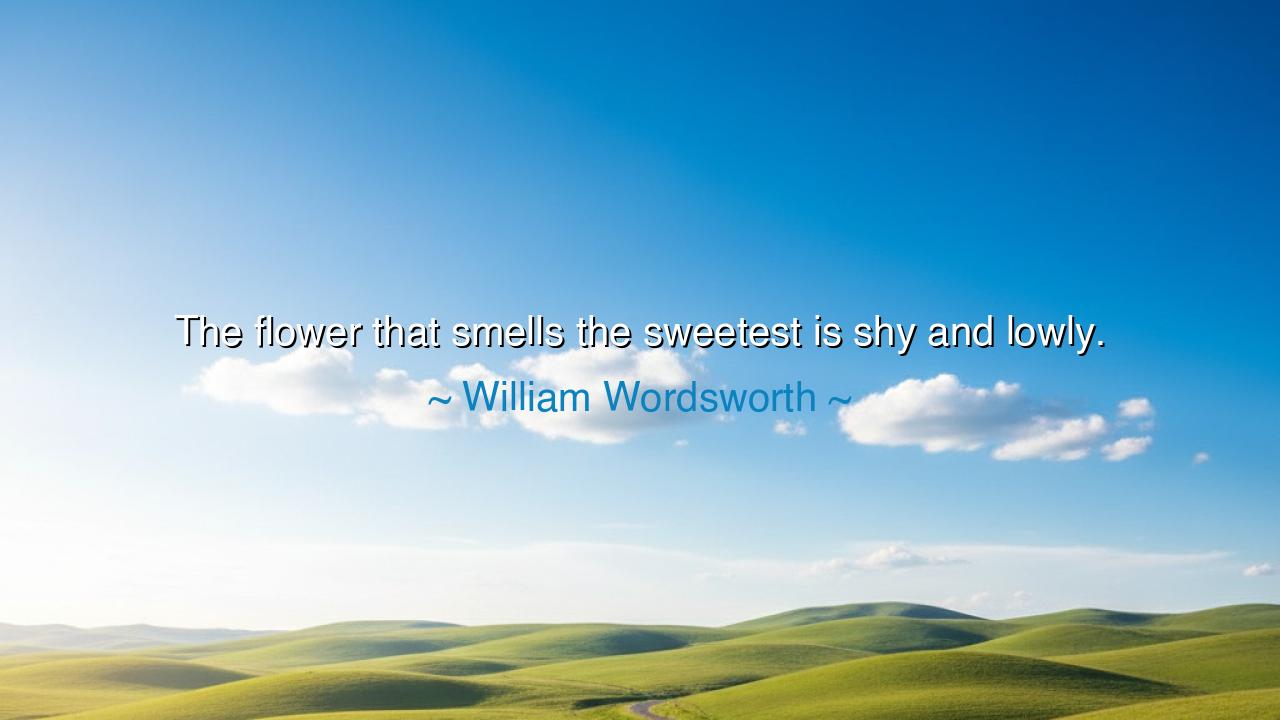
The flower that smells the sweetest is shy and lowly.






O Seekers of Truth, gather close and listen to the timeless words of William Wordsworth, whose wisdom transcends the ages. "The flower that smells the sweetest is shy and lowly." In this brief, yet profound statement, Wordsworth speaks of a deep truth about the nature of beauty, humility, and quiet strength. He reminds us that the most exquisite and powerful forces in the world are often not those that demand attention, but those that bloom in shyness, in the quiet, unassuming spaces where true beauty is cultivated and nurtured. It is a lesson not just for the eyes, but for the soul.
In the ancient world, the concept of modesty and humility was held in the highest regard. The Greeks, who celebrated the virtues of both wisdom and strength, knew that true greatness came not from boasting or seeking the spotlight, but from a quiet, steadfast commitment to one's purpose. The great philosopher Socrates was not celebrated for his physical appearance or wealth, but for his humility and his unwavering pursuit of knowledge. His legacy, like that of the shy flower, remains one of the sweetest to this day, not because of the loudness of his voice, but because of the depth of his wisdom and the purity of his intent. In the same way, Wordsworth’s quote reminds us that the most powerful and meaningful beauty is often hidden in quiet places, waiting for those with patience and discernment to recognize its true value.
Consider, O Seeker, the humble dandelion, which grows wild in the fields, often unnoticed, yet its vibrant yellow bloom is a sign of resilience and quiet grace. In many cultures, the dandelion represents the power of simplicity, and its humble appearance contrasts with its remarkable ability to spread joy and life wherever it grows. The dandelion, though shy and lowly in stature, is often the first to greet the dawn of spring, filling the air with its light, sweet scent. It does not seek attention or glory, yet its fragrance spreads far and wide, much like the quiet virtues of those who, though humble, leave a profound impact on the world. This humble flower embodies the wisdom of Wordsworth, showing us that greatness often hides in the places where others do not look.
In the Christian tradition, we are reminded of the meekness and humility of Christ, who was born in a humble stable and lived a life of service to others. His teachings centered on the power of quiet love and compassion, showing that it is not the loudest voices that change the world, but those who act with quiet strength and selfless devotion. Much like the flower that does not seek attention but spreads its fragrance effortlessly, the actions of the humble and the lowly have a profound and lasting effect on the world. Wordsworth’s words echo this deep truth, urging us to look beyond the loud and the flashy, and to recognize the quiet beauty that is often the most enduring.
Let us also consider the story of Confucius, the great Chinese philosopher who, in his humility, taught the values of benevolence, wisdom, and proper conduct. Though he could have sought power or recognition, he instead devoted his life to guiding others with humility and grace. His teachings, though simple in their presentation, have shaped millennia of thought and culture. Just as the sweetest flower blooms in the quietest corners of the garden, so too did Confucius’s wisdom spread gently but deeply through the world, influencing countless generations. Wordsworth’s insight into modesty and humility reveals that true strength and beauty do not need to be loud or conspicuous to be felt and appreciated.
The lesson here, O Seeker, is clear and profound: humility and modesty are not signs of weakness, but of true strength. The sweetest and most enduring beauty is often the kind that does not shout for attention, but simply exists in quiet grace. Just as the flower that grows in the shadows of the garden often exudes the most powerful scent, so too does the humble soul, who does not seek fame or recognition, but instead offers their gifts quietly, change the world in ways both subtle and profound.
In practical terms, O Seeker, ask yourself: where in your life can you cultivate humility and quiet strength? How can you embrace the simple, quiet beauty around you and within you, rather than seeking to prove your worth through loud actions or words? The lesson of the sweet flower is one of patience, of recognizing that true beauty and greatness lie not in the pursuit of outward recognition, but in the quiet acts of kindness, service, and selflessness that ripple through the world with lasting impact. Whether in your work, your relationships, or your inner journey, let your humility and grace guide you to true greatness, and you will find that the world responds in ways you could never have imagined.
May you, O Seeker, like the shy flower, bloom where you are planted—quietly, humbly, and with a beauty that is felt deeply, though it may not always be seen. And may your fragrance fill the air, spreading joy and wisdom to all those around you. **






AAdministratorAdministrator
Welcome, honored guests. Please leave a comment, we will respond soon